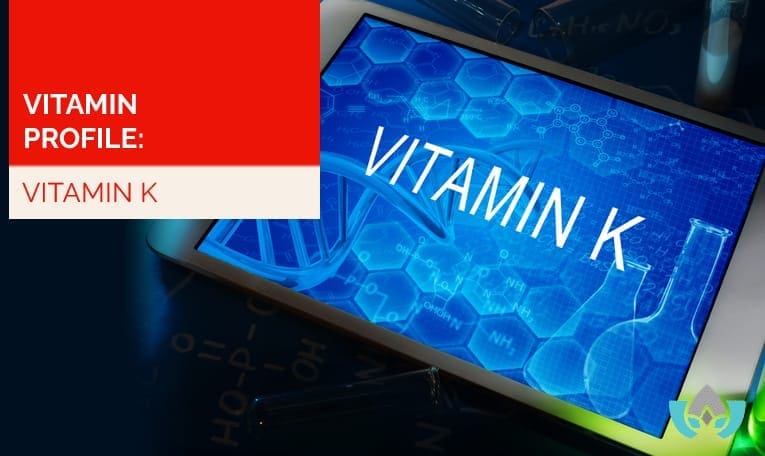
As a naturopath for cancer patients I want to help bring more attention to vitamin K.
Because when you think of vitamins which are important and essential to health, what comes to mind?
Maybe the B complex vitamins?
You likely know vitamin C is good for helping strengthen your immune system and vitamin D is important for bone health.
However, if someone asked you to tell them about vitamin K, you might not have much to say.
Vitamin K hasn’t had as much attention as some of its more well known counterparts, and we’re here to fix that.
Keep reading to learn more.
What Is Vitamin K?
Although many people don’t know much about vitamin K, it is an important nutrient which plays a vital role in your health.
It was first discovered due to the role it plays in helping blood to clot, as well as its role in protecting against tooth decay.
There are two forms of vitamin K: K1 and K2.
The first is generally found in plant based foods, and the second in animal based foods, as well as fermented foods.
In addition to this, the body can create K2 on its own.
Benefits Of Vitamin K
This little known vitamin has a variety of health benefits which come with it.
Let’s take a look at why you should be mindful of getting enough in your diet.
1. It May Be Good For Your Teeth
Some researchers have suggested vitamin K may play a role in dental health.
Osteocalcin is a protein which is important in regulating proteins which are linked to dental health, and it is activated by vitamin K2.
It is believed vitamins A, D and K2 work together to help keep your mouth and teeth healthy.
2. May Reduce Risk Of Cancer
Studies have been done to look at the link between vitamin K2 and cancer.
Studies in the journal Cancer, and also Anticancer Research suggest it may play a role in reducing recurrence of liver cancer, as well as increasing survival times.
Vitamin K2 has also been found to lower the risk of prostate cancer.
3. May Reduce Risk Of Heart Disease
There is evidence vitamin K can help prevent calcium build up in your arteries.
Given that the accumulation of calcium in the arteries is a major risk factor in developing heart disease, prevention of this could go a long way to helping reduce the risk of heart disease.
It’s important to note that to date, all of the studies done on this are observational, and more are needed to solidify this link.
4. May Reduce Risk Of Osteoporosis
Osteoporosis is an issue which is common in western countries.
It leads to the weakening of bones and increases the risk of broken bones.
Vitamin K2 has an important role in metabolizing calcium and may help prevent the development of osteoporosis.
Other ways to reduce your risk of osteoporosis include magnesium and balancing your hormones, particularly your estrogen.

Dietary Sources Of Vitamin K
If you’re worried you aren’t getting enough vitamin K, here are some ways to add more into your diet:
Sources of vitamin K1:
- Mustard greens
- Kale
- Collard greens
- Swiss chard
- Broccoli
- Spinach
- Brussel sprouts
- Kiwi
- Avocado
- Blackberries
- Pomegranate
Sources of vitamin K2:
- Fermented foods, like sauerkraut
- Egg yolks
- Ground beer
- Liver, kidneys, and other organ meats
- High fat dairy products
- Pork chops
- Chicken
- Hard cheeses
- Bacon
Causes And Symptoms Of Vitamin K Deficiency
Most adults who eat a varied diet don’t need to worry too much about vitamin K deficiency, however, there are some factors which can affect the body’s ability to create and absorb it.
Some of the symptoms of vitamin K deficiency include:
- Black, tar like stool, which contains blood
- Easily bruised
- Blood clots under the nails
- Bleeding in mucous membranes
In infants, some signs of deficiency include:
- Sudden brain bleed
- Bleeding of the penis, in circumcised children
- Bleeding of the skin, gastrointestinal tract, and nose
- Bleeding when the umbilical cord is cut
Some factors which can affect vitamin K levels include taking certain medications, such antibiotics or blood thinning medications, a diet low in vitamin K, or certain medical conditions which affect the body’s ability to absorb vitamin K.
Some medical conditions which may affect vitamin K levels include:
- Cystic fibrosis
- Disorders of the intestines, liver, bile ducts, or gallbladder
- Having part of the intestines removed
- Celiac disease
Book Your Appointment With The Mindful Healing Clinic Today
Do you have a condition which could impact your body’s ability to make or absorb vitamin K?
Are you worried about a deficiency of this, or any other important vitamins or nutrients?
I’m Dr. Maria Cavallazzi, a naturopathic doctor in Mississauga, and I can help.
Contact me today to learn more about how naturopathic medicine can be used to help keep you healthy and thriving.
Until next time,
Dr. Maria Cavallazzi, N.D
Mindful Healing Naturopathic Clinic
Mississauga, ON L5M 1L7
(905) 819-8200
► https://g.page/MindfulClinicNaturopathic
Dr. Maria Cavallazzi is a medical doctor from Colombia where she practiced as a family physician for 8 years until she moved to Canada 16 years ago and became a naturopathic doctor in Mississauga.


